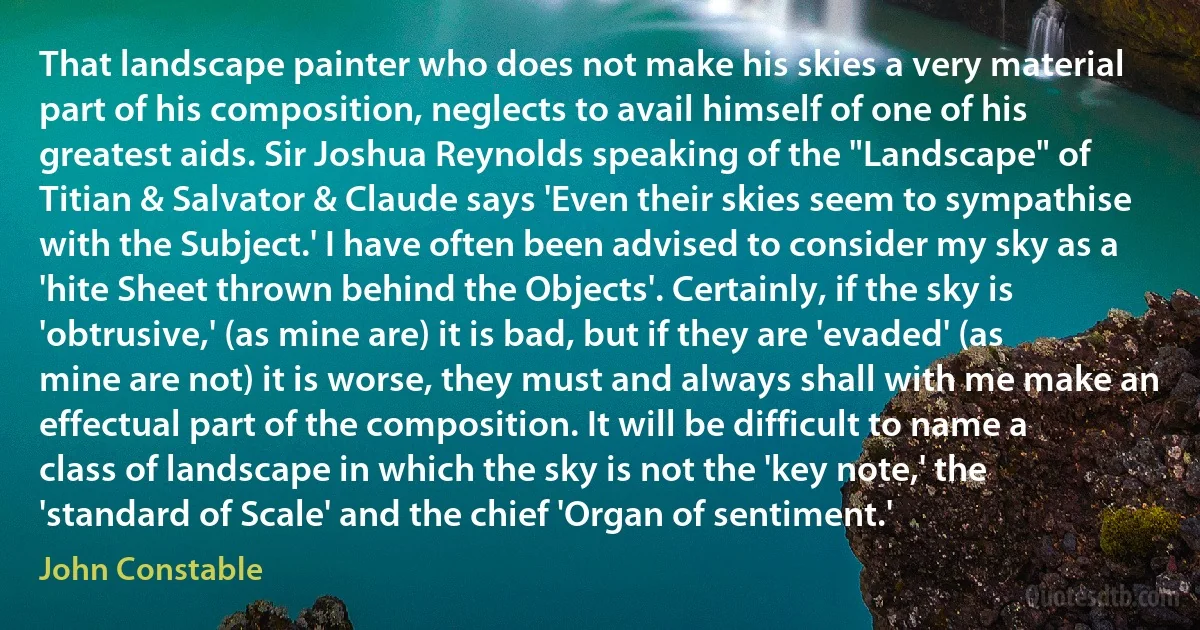
That landscape painter who does not make his skies a very material part of his composition, neglects to avail himself of one of his greatest aids. Sir Joshua Reynolds speaking of the "Landscape" of Titian & Salvator & Claude says 'Even their skies seem to sympathise with the Subject.' I have often been advised to consider my sky as a 'hite Sheet thrown behind the Objects'. Certainly, if the sky is 'obtrusive,' (as mine are) it is bad, but if they are 'evaded' (as mine are not) it is worse, they must and always shall with me make an effectual part of the composition. It will be difficult to name a class of landscape in which the sky is not the 'key note,' the 'standard of Scale' and the chief 'Organ of sentiment.'
John ConstableRelated topics
bad behind chief composition effectual key mine name note sentiment sky speaking throw worse joshua reynolds titianRelated quotes
I grew up in a mostly Buddhist environment. My father, when very young, was the first American to be ordained as a Buddhist monk. He now teaches Indo-Tibetan studies at Columbia University and is regarded as this country's foremost authority on Buddhism. When the Dalai Lama comes to America, it's my father who is his host. When asked if I consider myself Buddhist, the answer is, not really. But it's more my religion than any other because I was brought up with it in an intellectual and spiritual environment. I don't practice or preach it, however. But Buddhism has had a major effect on who I am and how I think about the world. What I have learned is that I like all religions, but only parts of them.

Uma Thurman
A willingness to satisfy contradictory objections to one's manner of writing might turn one's work into the donkey that finally found itself being carried by its masters, since some readers suggest that quotation marks are disruptive of pleasant progress; others, that notes to what should be complete are a pedantry or evidence of an insufficiently realized task. But since in anything I have written, there have been lines in which the chief interest is borrowed, and I have not yet been able to outgrow this hybrid method of composition, acknowledgements seem only honest. Perhaps those who are annoyed by provisos, detainments, and postscripts could be persuaded to take probity on faith and disregard the notes.

Marianne Moore
This is what happens, unquestionably – I am positive: an optical sensation is produced in our visual organ, which leads us classify as light, half-tone or quarter-tone, the planes represented by sensations of color. [Thus the light does not exist for the painter]. As long as, inevitably, one proceeds from black to white, the former of these abstractions being a kind of point of rest both for eye and brain, we flounder about, we cannot achieve self-mastery, get possession of ourselves. During this period (I tend to repeat myself, inevitably) we turn to the admirable works [of the five great Venetian painters a. o. Titian and Tintoretto] handed down to us through the ages, in which we find comfort and support...

Paul Cézanne
The very name of my subject, economics, suggests economizing or maximizing. But Political Economy has gone a long way beyond home economics. Indeed, it is only in the last third of the century, within my own lifetime as a scholar, that economic theory has had many pretensions to being itself useful to the practical businessman or bureaucrat. I seem to recall that a great economist of the last generation, A. C. Pigou of Cambridge University, once asked the rhetorical question, "Who would ever think of employing an economist to run a brewery?” Well, today, under the guise of operational research and managerial economics, the fanciest of our economic tools are being utilized in enterprises both public and private.

Paul Samuelson
The contention that control over the instruments of production is everywhere undergoing a shift, away from the capitalists proper and toward the managers, will seem to many fantastic and naive, especially if we are thinking in the first instance of the United States. Consider, it will be argued, the growth of monopoly in our times, Think of the Sixty Families, with their billions upon billions of wealth, their millions of shares of stock in the greatest corporations, and their lives which exceed in luxury and display anything even dreamed of by the rulers of past ages. The managers, even the chief of them, are only the servants, the bailiffs of the Sixty Families. How absurd to call the servant, master!

James Burnham
